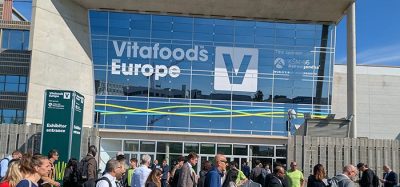An interview with Brian McKenna, President of EFFoST
- Like
- Digg
- Del
- Tumblr
- VKontakte
- Buffer
- Love This
- Odnoklassniki
- Meneame
- Blogger
- Amazon
- Yahoo Mail
- Gmail
- AOL
- Newsvine
- HackerNews
- Evernote
- MySpace
- Mail.ru
- Viadeo
- Line
- Comments
- Yummly
- SMS
- Viber
- Telegram
- Subscribe
- Skype
- Facebook Messenger
- Kakao
- LiveJournal
- Yammer
- Edgar
- Fintel
- Mix
- Instapaper
- Copy Link
Posted: 26 August 2010 | Brian McKenna, EFFoST | No comments yet
Currently serving his second term as President of EFFoST, the European Federation of Food Science & Technology, Brian McKenna sat down with New Food editor Helen Difford to talk about the group.
Brian, can you give some insight into who and what EFFoST is?
Currently serving his second term as President of EFFoST, the European Federation of Food Science & Technology, Brian McKenna sat down with New Food editor Helen Difford to talk about the group. Brian, can you give some insight into who and what EFFoST is?
Currently serving his second term as President of EFFoST, the European Federation of Food Science & Technology, Brian McKenna sat down with New Food editor Helen Difford to talk about the group.
Brian, can you give some insight into who and what EFFoST is?
The European Federation of Food Science & Technology (EFFoST) is a non-profit association that federates food science and technology organisations in Europe (in other words, the scientific societies relevant to food), from east to west and south to north. EFFoST is the European regional group of the world body – the International Union of Food Science & Technology (IUFoST), which in turn is a full member of the International Council for Science (ICSU), the scientific organisation of the United Nations (UN).
What is the objective of such an organisation?
EFFoST aims to develop closer contact between food producers and distributors, universities and research institutes and in this way, enhance rapid technology transfer from ideas / research into industrial applications to improve European competitiveness. It also promotes continuing professional development and educational excellence within food science and technology and works towards harmonising food legislation and enforcement programmes throughout Europe. Having so many member bodies, each having from hundreds to thousands of members, enables EFFoST to maintain a collaborative network of (research) organisations within the European food industry aimed at cooperation and ‘knowledge sharing’.
And what about the consumer?
Here again, EFFoST works to promote food science and technology among the general population in Europe. One way in which it does this is by participating as the disseminating partner in many publicly funded research activities. Indeed, its regular newsletters are frequently picked up by the press and used to form the basis of media reports. Also, while our annual conferences and symposia are primarily aimed at enhancing the exchange of information between scientist and the food industry, they are of a scale that always generates media interest in the host location and give rise to many news stories.
How does EFFoST work?
Apart from the conferences and newsletters mentioned above, EFFoST divides its activities amongst scientists and food industry personnel who have a particular interest in a topic. At any time, we have more than 50 Special Interest Groups (SIGs) and Task Teams (TTs) who are working on aspects of our activities. Of course, the level of activity of each is dependent on the enthusiasm of the group members but, in general, we are very fortunate in having very active members driving these initiatives. Examples of such groups are Global Harmonisation (they already have an excellent book on Ensuring Global Food Safety), Acceptance of New Technologies, Water in Relation to Foods, and many, many more.
Are you happy that the organisation is achieving its objectives?
While the organisation is very large (we estimate around 80,000 in our Europe-wide member societies), the number of ‘active’ members, i.e. those working to further the objectives of EFFoST is relatively small and more volunteers are always welcomed. We also suffer from the universal complaint of scientific network organisations, namely, that we attract many active participants from academia and research and too few from the food industry. We are continuously trying to correct this by developing further services of interest to the food industry, such as our Food-Info website. Also, by forming collaborations with industry oriented magazines such as New Food, we hope to bring our activities more to the attention of the food industry. Of course, in our research dissemination activities, we are always working in partnership with individual industries but we are constantly striving to widen this group.
What’s next on the EFFoST agenda?
Well, our next major activity is our annual conference which will be held this year in Dublin on the theme of Food and Health. While the interaction between food and health has been the subject of many scientific conferences in recent years, they have normally concentrated on the physiological / medical interactions. We are trying to give the theme more industry focus by having five half day mini-symposia on the themes of Nutrition and Health, Functional Foods, Functional Ingredients, Processing for Healthy Foods and the Safety Aspects of Healthy Foods. In this way, we are hoping to attract a sizable industry focused attendance.
About the author
Brian McKenna
In addition to his role as EFFoST President, Brian is Emeritus Professor of Food Science at University College Dublin, where he was Vice-President for Life Sciences. Brian’s research interests include the physical properties of foods, rapid chilling of beef and lamb, meat texture, food safety and shelf-life prediction of foods, radio frequency heating of foods and formulation of functional drinks. He has published 12 books and over 100 papers.









